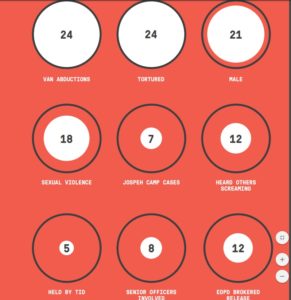by International Truth & Justice Project, South Africa, July 2017
Full report at http://www.itjpsl.com/assets/ITJP_unstopped_report_final.pdf or
The ITJP is administered by the Foundation for Human Rights in South Africa under the guidance of its director, transitional justice expert, Yasmin Sooka. The ITJP team includes former prosecutors and investigators from the Ad Hoc Tribunal for the Former Yugoslavia (ICTY) and Rwanda [ICTR], lawyers who have worked for the South African Truth and Reconciliation Commission, the Timor-Leste Commission, the United Nations, the Special Court of Sierra Leone and the International Criminal Court who collectively have decades of experience in investigation of sexual violence and torture, and in many instances first hand knowledge of investigations relating to Sri Lanka. itjpsl.com stop-torture.com

ITJP witnesses
Executive Summary
This report establishes that in 2016/17 both the military and police in Sri Lanka continue to abduct, unlawfully detain, torture and rape Tamils.
The violations remain systematic and officially sanctioned by command structures within the security forces. Victims describe senior officers coming into their torture chambers [Page 63]. A standard operating procedure continues, involving three security force teams – one abducting, one interrogating and another releasing for money [Page 18]. Once the victim has fled, their family remains under surveillance by the intelligence services in order to keep them quiet [Page 53].
This is hardly the action of low level “rotten apples” in the security forces. Detainees are held in purpose-built cells while interrogation rooms are equipped with tools for torture including metal bars from which to hang victims [Page 20].
Women officers are involved when there are female detainees and they also participate in the torture [Page 38]. Victims also report being biometrically fingerprinted – equipment that is not used by organised crime [Page 52].
Corruption is rampant. All the victims are eventually released on payment of money by their families. Security officials actively solicit the ransoms when the families are slow to respond to the abduction [Page 59]. Half the releases were brokered by a pro-government Tamil paramilitary group, the Eelam People’s Democratic Party [EPDP] which to our knowledge has never been investigated regarding this issue [Page 61]. The brokers who secure release often also arrange the human smuggling abroad, instructing the victims to leave the country if they want to stay alive. Victims in 2016/17 describe Sri Lankan immigration officials at Colombo airport being paid off by the smugglers to allow them through without any questions [Page 67].
The Vanni Security Force Headquarters in Vavuniya, known as Joseph Camp, continues to be a site for torture and rape in 2016/17, including by the Terrorism Investigation Division (TID) of the police. Seven Tamils were tortured there in 2016/17 and several heard other detainees screaming [Page 20]. There continue to be very high rates of male sexual violence reported – something that is not acknowledged within the country with the result that victims lack support [Page 41]. Victims outside Sri Lanka also struggle to cope and are not able to disclose what has happened to them because of the stigma, with most attempting or talking about suicide [Page 74].
The wanton cruelty and racism exhibited by the perpetrators also raises serious questions about whether a conventional security sector reform process that downsizes the military and finds alternative employment can address this level of systematic abuse. An intensive programme of rehabilitation which includes mental health care treatment is needed for the perpetrators, as well as their victims, though obviously not at the cost of holding torturers and rapists accountable for their crimes.
The Sri Lankan Government is complicit in the ongoing violations in so far as credible allegations have repeatedly been brought to their attention and they have consistently failed to act to prevent such violations and to hold those responsible accountable. The inescapable conclusion is that they have done nothing for 30 months because they prefer to condone the persecution of Tamils rather than dismantle the security structures responsible, which might lose them electoral or political support.
The ITJP calls on international governments who respect human rights to take urgent steps to hold Sri Lanka’s political leaders accountable for the violations that continue under their watch, let alone mass atrocities committed during previous governments.
Contents
METHODOLOGY ……………………………. 8
ABDUCTION ……………………………… 13
DETENTION CELLS …………………….. 19
TORTURE ………………………………… 35
SEXUAL VIOLENCE …………………….. 39
INTERROGATION…………………………. 48
SURVEILLANCE …………………………. 53
RELEASE………………………………….. 56
ALLEGED PERPETRATORS……………….. 63
HUMAN SMUGGLING………………………. 67
AFTERMATH ……………………………… 73
RECOMMENDATIONS …………………….. 78
TORTURE METHODS GLOSSARY ……….. 80
ENDNOTES ………………………………. 85